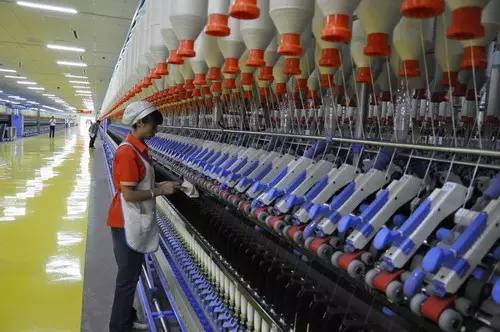In our eyes, the luxury goods are the glittering Cartier bracelets, and the Hermes bags are hard to find... We will not pay attention to the fabrics and yarns of those gorgeous clothes. In the "2017 Global Luxury Top 100" released by Deloitte (one of the world's top four accounting firms), France's Shandong Ruyi Group's French SMC P and Japan's main board listed company Renown Incorporated ranked 51st and 58th respectively. Ruyi is also the only company in China that has entered the top 100 apparel luxury goods through holdings. 1. A legend of a woolen textile mill In our eyes, the luxury goods are the glittering Cartier bracelets, the Hermes bags that are hard to find, the limited edition LV that is also wanted to be queued overnight, the Chanel set that is hand-stitched day and night, and it is hard to find a ticket. FASHION SHOW is a high-end shopping mall with plenty of air-conditioning and few people... We won't pay attention to the fabrics and yarns of those gorgeous clothes. When it comes to yarn, it reminds people of the textile factory. The women workers wear light blue uniform uniforms and pull their hair into a white cotton hat. In our concept, it is difficult to link traditional textile factories with fashion and technology. And this company with the world's largest cotton spinning and woolen textile and garment industry chain, Ruyi, tells us that its nothing is impossible with its excellent global globalization. Ruyi Group was formerly known as “Shandong Jining Ruyi Wool Textile Co., Ltd.â€, formerly known as Shandong Jining Wool Textile Factory, which was founded in 1972. It is a world-renowned innovative technical textile enterprise and one of the largest textile manufacturers in China. The picture shows China's first spinning automatic complete production line of Ruyi Group settled in Yinchuan. At present, it has two complete textile and garment industrial chains of the world's largest cotton spinning, wool spinning and clothing brands; it has 2 domestic listed companies and 2 listed companies in Tokyo, and 20 wholly-owned and holding subsidiaries with annual sales exceeding 4.6 billion. The US dollar has 30,000 employees; it ranks 304th among the top 500 Chinese enterprises, and China's top 100 multinational corporations have the 63rd cross-border, and its comprehensive competitiveness ranks among the top four in China's top 500 textile and apparel industries. According to relevant sources, the French fashion group SMCP controlled by Ruyi Group entrusted Bank of America Merrill Lynch, JP Morgan and KKR Capital Markets as the global joint coordination agency. The company plans to go public in Paris this fall. In October 2016, Ruyi Group acquired 80% of SMCP's shares for 1.3 billion euros, which is currently the largest M&A transaction in China's fashion sector. SMCP is the parent company of the French fashion luxury brands Sandro, Maje and Claudie Pierlot. This is just a small step forward for Ruyi Group to enter the globalization. As early as March of this year, Ruyi Group acquired the British windbreaker brand Agger Cuttan Aquascutum under the YGM trade for US$117 million. The Aquascutum has a long history and was founded in 1852 by the British tailor John Emary who invented the waterproof wool fabric. The Aquascutum windbreaker was originally a military product, but it soon became a fashion brand. British Prime Minister Churchill wears Aquascutum many times In 2014, Ruyi became the main shareholder of Peine Gruppe, a German men's suit manufacturer. Peine Gruppe was founded in 1948, when the company name was Bawi. Specializing in menswear production, it owns the Barutti and Masterhand brands. The company has faced various difficulties since 2009 and filed for bankruptcy restructuring, which was later acquired by the US Gordon Brothers Foundation. After wishing to buy shares, his many years of difficulties have come to an end. Jan Leuze, general manager of Peine Gruppe, said, “We still maintain independence in terms of procurement and production sites, but we will use the strength of Shandong Ruyi Group if it is beneficial to both parties.†In 2013, he became a member of the Scottish tweed manufacturer Carloway. In 2010, Ruyi Group spent about 4 billion yen to acquire the Japanese brand RENOWN Rena, becoming the company's largest shareholder. Before the frequent acquisition of well-known foreign brands, Shandong Ruyi's more business focused on the development and production of fabrics. It has achieved world-leading scientific and technological achievements, and a number of technologies and products have filled the domestic gap and reached the international advanced level. Occupy the domestic high-end market of worsted wool, customers include international brands such as Armani. Ruyi has a certain position in the fabric manufacturer, but has never done anything in the end product clothing. In the clothing business, it is more to do the OEM business. The acquisition of foreign brands can not only improve the influence of the wishfulness in the field of clothing, but also bring more benefits. The data shows that Ruyi Group achieved revenue of 59.24 million yuan in 2015, up 2.5% year-on-year, and net profit was 17.12 million yuan, turning losses into profits in 2014. In 2016, Ruyi Group's operating income was 906 million yuan and its net profit was 32.768 million yuan. In the first quarter of this year, Ruyi Group's operating income was 181 million yuan, and net profit was 49.7921 million yuan, an increase of 93.99% year-on-year. 2. Mergers and acquisitions of overseas brands have become the trend of local companies Not only is it just a wish, the acquisition of overseas brands seems to be a boom in the development of local companies. Anta announced the acquisition of the Korean brand kolon in February 2017 and the British outdoor brand Sprandi in 2015. In August 2017, the company acquired the VIVIENNE TAM brand established in New York in 1994 by American fashion designer VIVIENNE TAM in China. 75% of the mainland's equity. Not limited to the apparel industry, Haier Group acquired Southeast Asia Sanyo, New Zealand Fisher & Paykel, US GEA; Midea acquired Toshiba White, Germany KUKA, Italy Clivet; Hisense acquired Sharp Mexico factory and acquired Sharp America brand use rights. After the domestic market is saturated, it is an inevitable way to go international. We observe the development strategy of Chinese apparel enterprises. The early overseas expansion was mainly based on OEM OEM and independent brand promotion. In recent years, overseas mergers and acquisitions have seen a significant increase. According to data from Bloomberg, the total amount of Chinese companies' overseas acquisitions has reached US$50.2 billion since 2016, more than double the US$24.3 billion in the same period in 2015. Qiu Yafu, the chairman of Ruyi Group, once said: "Creating a fashionable and high-end ready-to-wear brand is still difficult to achieve in the short term." At present, China's garment industry has a gap with overseas developed countries in terms of innovation and design capabilities. In other words, the acquisition of overseas brands has become a “shortcutâ€. Save time in branding The construction of brand advantages in every market needs to be done through products with obvious competitive advantages and effective channel promotion, which may take decades. In the case that a strong local brand has occupied the market, Chinese companies want to open overseas markets directly through their own brands and need to face greater challenges. The acquisition of overseas local brands and channel advantages through mergers and acquisitions, and then based on this, to expand overseas markets is a shortcut to the global market. Consumers generally believe that foreign brands are high-end Everyone's consumer psychology is still not accepted for high-end brands from China. "If it is a French or Italian brand, people will think it is high-end." The acquisition of foreign brands is a good cut from the marketing point of view. And when international brands enter the mall, the barriers are much less. Expand brand line For different companies, the acquisition is obviously a supplement to their own business. For example, the Ruyi Group's overseas acquisition of luxury brands is extending the business field from textile manufacturing to high-end brand clothing. The acquisition of overseas brands by Gloria is a derivative of its own product line. 3, funding is not a problem It’s a problem to get back to life. In recent years, the large-scale mergers and acquisitions of Chinese companies and the acceleration of Chinese companies' mergers and acquisitions have caused strong international attention. Funding is not a problem. To succeed in “going outâ€, it is not enough to rely solely on strong capital and preferential acquisitions. In the process of mergers and acquisitions to learn, run-in, and absorb their respective teams and culture. The most difficult thing about M&A is not to buy this company, but to make this company last forever and come back to life. As Qiu Yafu said: "Many bosses in China don't love clothing. They just use clothing as a tool to make money. They must maximize their benefits immediately. This is the most worrying place for foreigners. At that time, Chinese companies that negotiated SMCP included Fosun and Yi Yi. Capital, but the final choice, in addition to the price, is mainly our attitude towards the brand." Qiu Yafu, chairman of Ruyi Group, said in the announcement that SMCP's design and creative team continued to operate at its headquarters in Paris to maintain SMCP's fashion genes and brand image. While retaining its existing corporate strategy and organizational structure, SMCP will also benefit from the global retail expertise of its new shareholders. It is very clear that SMCP needs his founder to lead the brand to continue, post-investment management is not as good as how many resources can change SMCP. In the period when Ruyi team can't integrate cross-border M&A enterprises, sincere cooperation is the key to solving post-investment management. This way of solving problems provides a good reference for Chinese companies to go global. Overseas mergers and acquisitions are a door for Chinese apparel companies to open up globalization. Fashion is global, Chinese clothing brands are also globalizing, Chinese companies have to go out and tell the world our strength! Editor in charge: Wang Zhen
BELIEYE clip on glasses, as always, support multi-scenario use, including functional use in four scenes, including Clip On Sunglasses, blue light clip on glasses, clip on Reading Glasses, and clip on night driving glasses, perfectly supporting various eye needs in daily life. The combination of stylish and sustainable is what makes us unique. Elevate your style with BELIEYE clip-on glasses that will make a statement wherever you are.
â— BELIEYE glasses clip, it is suitable for both prescription and non-prescription glasses, and can be attached to most frames.
â— Flip-up clip on eyeglasses are easy to wear. Simply clip them onto your existing glasses, and you're good to go.
â— The clip is tight and durable, so it won't fall off the frame of the glasses. In addition, with a soft silicone material, it will be able to protect the glasses from being scratched.
â— Colors and styles can be customized according to your preferences.
clip on glasses,flip up glasses,glasses clip,clip on eyeglasses Belieye (Jiangsu) Co.,LTD , https://www.believeglasses.com


